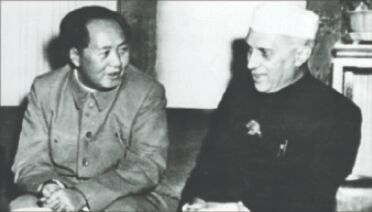On the wrong side of history

As PM Modi attempts to settle our unsettled history, the Gandhi family must answer for the mistakes of Pandit Nehru in extolling the communists, eschewing national defence and misreading Chinese intentions
In his foreword to Sitaram Ram Goel’s book, In Defence of Comrade Krishna Menon: a political biography of Pandit Nehru (1963), public intellectual, erstwhile Communist, one of the founders of the Communist Party of India, later bitter critic, sometime collaborator of C Rajagopalachari, who also edited Swarajya, run by C.R., Philip Spratt asked a question about Nehru’s fascination for and indulgence shown to the Communist Party which was at that time heavily funded and supported by international communist conglomerates.
At the time Spratt wrote his foreword, many in the country were also raising the same point. ‘Nehru’s communism’, wrote Spratt, ‘is revealed in the extraordinary favour he shows to the Communist Party, as contrasted with his marked coolness towards the socialists who put democracy first, like the PSP (Praja Socialist Party, whose stalwarts were likes of Acharya Narendra Deva). He allows the Russian (Soviet) Government, and apparently the Chinese too, to subsidise them. It has been admitted in Parliament that the Home Department knows about some of these foreign funds. No other ruler in the world tolerates this kind of thing. Why does Nehru?’ Nehru looked the other way because he was both fascinated and overawed by the Communist juggernauts. He obviously never answered this question, such a working arrangement suited him and his politics.
It was Nehru’s backing of the communists and Indira’s outsourcing of the building of academic institutions in India to them that enabled them to set up a base within the intelligentsia. Sitaram Goel has best described what communists eventually did to India’s governance structures and academia, “Communism is an ideology as well as an organisation. While the ideology perverts and subverts men’s minds, the organisation infiltrates and disintegrates all institutionalised life within a given community…”
When it came to his handling of the 1962 situation with China, Nehru was intolerant of criticism. He did not hesitate to put even patriots and Gandhians in prison. When the young Gandhian, social scientist and historian of India’s colonisation, Dharampal, incensed at the debacle of 1962, wrote an open letter to members of the Lok Sabha, ‘calling for Jawaharlal Nehru’s resignation on moral grounds’, he was arrested along with two of his other co-signatories, for this ‘castigatory act’ and imprisoned in Tihar Jail.
Unlike Nehru’s great-grandson today, Dharampal, one of the greatest scholars of modern India, did not impute motive to the armed forces, did not doubt their valour, nor indulged in taking cheap pot-shots aimed at trying to demoralise our armed forces, and yet he was thrown in prison. It was only at the intervention of Jaya Prakash Narayan and Lal Bahadur Shastri that he was released after a few months. Nehru was indulgent towards communists who always attempted to compromise India’s national interest but displayed vindictiveness towards patriots who stood their ground in defence of India. Of course, those days were the heydays of Nehruvian democracy when every critic would be hounded, while today under Narendra Modi, when Nehru’s great-grandson, sitting in the confines of his plush home, posts misleading and mischievous social videos on the Galwan Valley episode, is the heyday of India’s actual democracy, which allows voice and space even to irrational, confused, convoluted, self-obsessed elements who pass off as leaders.
India’s first Public Works Minister, NV Gadgil (1896-1966), a keen observer of the affairs of that era, records in his memoirs how, when the cabinet ‘first discussed planning, I suggested that our defence needs should also be considered part of it. Nehru did not approve the idea’ and though Nehru spoke of modernising our defence forces and initiated some action to that effect, recalled Gadgil, a considerable part of the procurement effort created ‘scandals like the Jeep scandal and progress was tardy and unsatisfactory…Our border defences were neglected because of the firm conviction of Nehru that since we had no quarrel with anyone, no one would attack us…’
Let us also recall how the recommendations of the committee formed under the then deputy Defence Minister Major General Himmatsinghji were mostly ignored or overlooked by Nehru. The high powered committee points out Claude Arpi, in an analysis of the committee’s mandate and role, was also called the ‘North and North East Border Defence Committee’ and sent its report in two parts in April and September 1951. According to BN Mullik, Nehru’s IB chief, Arpi notes, the committee was mandated ‘to make recommendations about the measures that should be taken to improve administration, defence, communication, etc., of all the frontier areas.’
The Committee noted that for defending the long border, which was ‘inaccessible in many sections, one of the essentials, was a system of roads to and along the border; such roads, as were already there, should be improved and new roads should be planned and constructed.’ The Committee also made a slew of other recommendations, notes the authors of an incisive and insightful work on Nehru’s tenure as Prime Minister. ‘Unfortunately, most of the recommendations received scant attention from Nehru.’ He completely ignored Northern and Eastern Ladakh. “It is an uninhabitable area and it has not been under any kind of administration. Nobody has been present there…” he said. Nehru’s policy thus, as his political assessors describe it, was a policy based on ‘illusion, a policy of neglect, a policy in which armed defence had a low priority.’
Between 2009 and 2014, when Rahul Gandhi and his mother called the shots of governance, the Border Road Organisation’s (BRO) budget remained stagnant at about Rs 4,000 crore, while in 2018 it jumped to Rs 5,400 crore and to Rs 8,000 crore in 2019-2020 and is expected to go up to Rs 10,000 crore in 2020-21. Nehru’s heirs stuck to his policy, while the one whom they revel in pouring scorn onto has completely overturned that policy of deliberately neglecting our border defence.
Over the last few days, Congress leaders have been asking as to why should questions be asked of Nehru today on what he did or did not do with our infrastructure along the border? However, questions were asked of Nehru during his tenure, they have been asked later and will continue to be asked in future too. In fact, the political evolution of a vibrant democracy must always ensure that its political discourse is a continuum, that its collective memory remains on the surface and not allowed to sink or be brushed away. Past failings have and do have a fundamental bearing on present situations and challenges. Especially now when Prime Minister Modi believes in settling unsettled facts of our history. Therefore Nehru still needs to be questioned, his handling of China, his handling of international and Indian communists, his neglect of India’s defence, his refusal to pay heed to the strengthening of our border defence, all these questions must be asked of him. Similarly, Nehru’s political heirs must be able to answer these in detail and also be able to explain as to why they did precious little in trying to revise that policy. After-all, does not Rahul Gandhi and his court historians keep asking questions of the RSS, of Syama Prasad Mookerjee, of Guruji Sri Golwalkar, the BJP and its past leaders?
Rahul Gandhi and his mother also need to answer and clarify on why is it that despite knowing that the Chinese government had not invited the then Prime Minister of India Dr Manmohan Singh for the Beijing Olympics in 2008, and had instead extended the invitation to Sonia Gandhi, did they accept the invitation? Why was it not made clear to the Chinese that this was an insult to India, that while several other heads of state such as George Bush, Sarkozy, the Japanese PM, the President of Mauritius were invited, the Indian Prime Minister was bypassed? How could the entire Gandhi family entourage accept the invitation and proceed for the Beijing jamboree? Till date, the Congress has also not been able to explain as what transpired in that dinner that Rahul Gandhi had with the Chinese ambassador in New Delhi while Doklam was raging in 2017? Was the dinner a state or constitutional obligation or was it a misplaced and ill-timed personalised display of bonhomie indicating on which side the Congress leadership stood?
These are questions that the people of India are asking of the Congress and its first family. These have to be answered squarely by Rahul Gandhi and his mother. They cannot ward-off these concerns by demonstrating false solidarity and hypocritical concern for our armed forces.
The writer is the Director of Dr Syama Prasad Mookerjee Research Foundation. Views expressed are personal

















